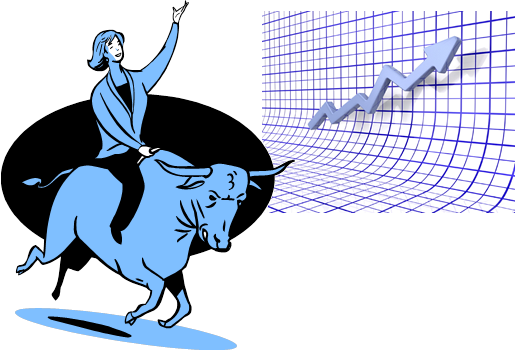In share market, when someone takes a position, one may be hopeful that price of a share will go up or go down. One may want to take delivery of shares for longer time even though one may not have the money now. Similarly, someone may want to sell shares now anticipating fall of share prices in future even though that person does own those shares. These are the situations where Badla was at rescue for Indian Stock Exchange.
Badla has two variants – Vyaj Badla and Undha Badla.
1. Vyaj Badla
Suppose person A bought 1 share of company C for Rs 1000 in a weekday. He had time until Friday to make final payment and take the delivery or square off his position. However, the person does not have Rs 1000 and he anticipates that price of this share will go higher. If by Friday, price of the share reaches Rs 1100 and the person does not want to square off his position then he may request broker to arrange for badla.
On Saturday, special trading session was organized called Badla Session in which all the trades that were not squared off the day before were presented. Last price of Friday would become Hawala Price (the price at which one could take delivery). Financers would quote for the premium they will charge for financing the price of shares of company C. Suppose financers quoted Rs 3.80 premium for next trading cycle.
Person A will be given difference between the price he purchased the share of company C and hawala price. If the difference comes out to be negative then person A will need to pay the balance to financer. The shares will be retained by exchange. Person A can make the payment of Hawala price + Badla premium to take delivery of share in next trading session.
Illustration of when price of share escalates
Price of share on the day of purchase of share = Rs 1000
Hawala Price (the closing price on last settlement day Friday) = Rs 1100
Badla Price (premium, say 18% per annum for 1 week on Hawala Price) = Rs 3.80
Money given to buyer in Badla session = Hawala price – price of share on day of purchase = Rs 1100 – 1000 = Rs 100
Price at which buyer can get delivery = Hawala Price + Badla Price = Rs 1100 + Rs 3.80 = Rs 1103.80
Suppose price of share next week reaches to Rs 1300 then buyer will be at benefit because he would bought the shares at Rs 1003.80. He will make a profit of Rs 296.20 (1300-1003.80).
Illustration of when price of share falls
Price of share on the day of purchase of share = Rs 1000
Hawala Price (the closing price on last settlement day Friday) = Rs 900
Badla Price (premium, say 18% per annum for 1 week on Hawala Price) = Rs 3.11
Money given by buyer in Badla session = Price of share on day of purchase – Hawala price = Rs 1000 – 900 = Rs 100
Price at which buyer can get delivery = Hawala Price + Badla Price = Rs 900 + Rs 3.11 = Rs 903.11
Suppose price of share next week reaches to Rs 1300 then buyer will be at benefit because he would have bought the shares at Rs 1003.11 (903.11+100). He will make a profit of Rs 296.89 (1300-1003.11).
2. Undha Badla
Suppose person A anticipates that price of share of company C trading for Rs 1000 will fall further and he does not want to deliver his shares or does not have the shares of company C then he may go for Undha Badla. He will sell shares of company C on any weekday say at price Rs 1000 and he has time until end of week to deliver the shares to buyer. On Badla session on Friday, his broker will call for any broker whose client (say person B) would be willing to given loan of shares of company C to person A. The person who will give that loan of shares will ask for Badla premium and lend the shares to person A.
Suppose price of share has already fallen to Rs 900 on Friday (Hawala Price) then person A will get difference between the price of selling of shares of company C and hawala price. If the price of share has risen to Rs 1100 then he will need to give away the difference to the person who lent him the shares.
The money earned by delivery of shares (Hawala Money) will be kept with exchange.
At the time of settlement person A will deliver the shares of company C and the exchange will pay person A the hawala price – badla premium.
Illustration of when price of share escalates
Price of share on the day of selling of share = Rs 1000
Hawala Price (the closing price on last settlement day Friday) = Rs 1100
Badla Price (premium, say 18% per annum for 1 week on Hawala Price) = Rs 3.80
Money given by seller A in Badla session = Hawala Price – Price of share on day of selling = Rs 1100 – 1000 = Rs 100
Hawala money retained with exchange = Rs 1100
Suppose price of share falls next week to Rs 700 then person A may buy the shares at Rs 700 and return the shares to exchange and get Rs 1000 – badla price making a profit of Rs 296.20 (Rs 1000-700-3.80).
Illustration of when price of share falls
Price of share on the day of selling of share = Rs 1000
Hawala Price (the closing price on last settlement day Friday) = Rs 900
Badla Price (premium, say 18% per annum for 1 week on Hawala Price) = Rs 3.11
Money given to seller in Badla session = Price of share on day of purchase – Hawala price = Rs 1100 – 1000 = Rs 100
Hawala money retained with exchange = Rs 900
Suppose price of share falls next week to Rs 700 then person A may buy the shares at Rs 700 and return the shares to exchange and get Rs 1000 – badla price making a profit of Rs 296.89 (1000-700-3.11).
Does it still work?
No, Badla has been banned in India permanently (it was banned twice before it was finally banned forever). The reasons cited for banning of badla are as follows:
- Deciding badla price was out of control of regulator (SEBI). The deal was covertly done by financers, speculators and brokers.
- Badla is the indigenous Indian technique and world over markets used derivates and futures. Badla had to be abolished to make room for standard techniques.
- After some big scams such as bull run caused by Harshad Mehta and Ketan Parekh, Badla was thought to be a cause in those scams. It is believed that SEBI wanted to look decisive in front of JPC constituted to investigate the cause of scams.
- According to one opinion, this system instituted the worst of both the spot (cash) and future market.